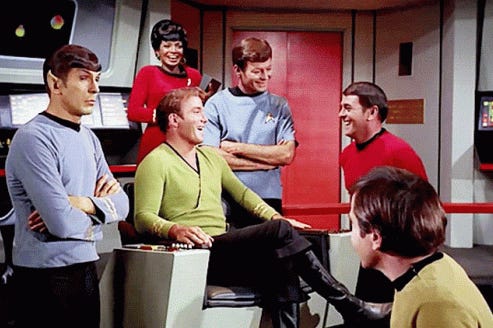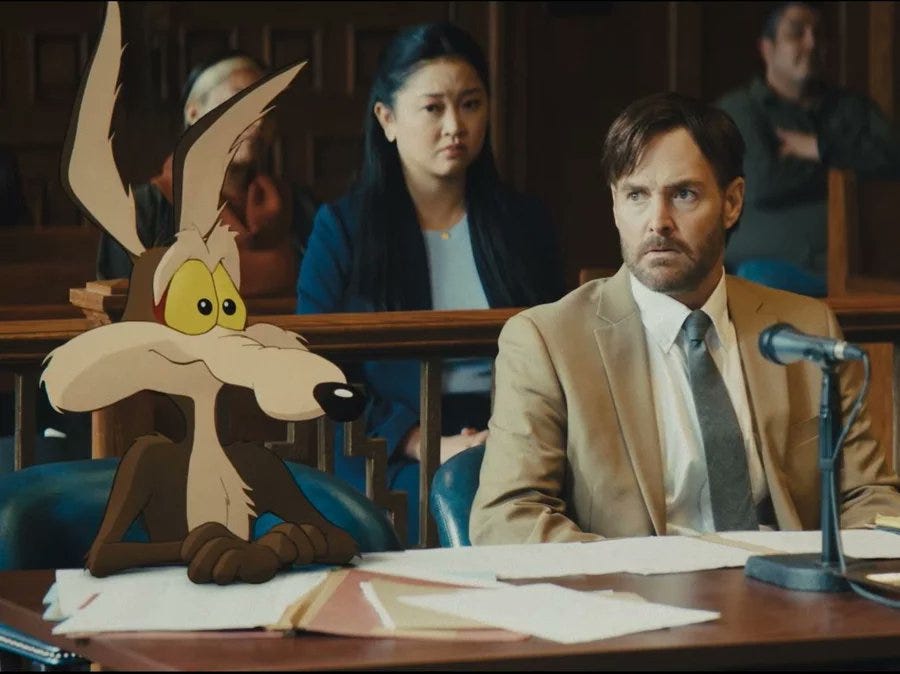Why Capitalism is Failing Digital Media
We're too stuck on old modes of thinking to embrace better ways of living
Like most writers who don’t get any solid income from this stuff, I have a regular job. It’s an office job. I won’t go into too much detail, but basically a large amount of my responsibility at work involves determining whether people are permitted access to documents, and if so, giving them those documents. Yes, it’s every bit as thrilling as that sounds. I’m a cubicle snail. It’s all licensing and copyright and blah blah.
Now, back when, I guess, computer networks were new, maybe as recently as the 90s, licensing would have been a comparatively simpler thing. You could control, for example, how many copies of anything were in the world. You could print one thousand books, and that’s how many copies of that book existed. It was easy to control supply and demand that way—one of the bedrocks of capitalism. It’s how you assign commodity value.
Now that a document can be duplicated, for all intents and purposes infinitely, with no effort, and copies distributed to any other computer terminal in the world instantly, licensing is no longer limited by any physical boundary that can be imposed. But we still need to limit supply for capitalism to work as normal. So we now do it artificially. With words, and agreements, and lots of paperwork, and contracts. We play pretend, like Peter Pan’s lost boys carving up the invisible turkey.
Now it’s my job to interpret all these licenses to ensure we’re adhering strictly to the rules the licensors have laid out about how, or if, materials can be shared, and to whom. There are all sorts of terms and conditions for every situation but one of my favourites goes like this -
This document can be distributed to a particular client under the following conditions:
- The document is downloaded to our system as a PDF.
- The PDF is printed physically.
- The PDF is deleted.
- The printed document is scanned and converted to PDF.
- The printed document is destroyed.
- The PDF is given to the client.
This all happens in one room, at the same time. The printed document isn’t transported anywhere. The paper disposal is right next to the printer for convenience. The document comes out of the printer, then back through the same machine to digitise it, then into the bin.
Now, I don’t know exactly what line of reasoning led to the decision that this chain of events must occur for us to be license compliant. But I suspect it’s a process that evolved in steps to maintain constant control over the illusion that one document exists, either physical or imaginary but never both. Reproduction of the document must be avoided. You can’t just copy a file endlessly and hand it out for a similar reason to why you can’t share your Netflix password. By translating the digital file into a paper format, and then deleting the file, you are maintaining the continuum of one single existing copy.
In a time before the internet, this would pretty much look like us printing a magazine to sell. We’ve fulfilled the portion of our obligation to the licensor in obtaining this single copy of the document. However, this is the internet age—we don’t need to distribute this document physically. In fact our clients prefer we don’t. It’s slow to put a physical document in their hands that they would prefer to read on the computer anyway. We can simply scan this document for them and transport it digitally.
But how do we achieve this without reproducing the document, maintaining its single-copy continuum? Simple—destroy the document after digitising it.
Now, I’m sure somebody will tell me something like how it also scrubs all the metadata from the original file by laundering it through meatspace like this. It’s probably not as Kafkaesque as it appears. But you have to admit, ontologically, it does seem very close to identical to an alternate scenario in which I download the file, email it, delete my copy, then walk across the room, take three blank sheets of office paper, and throw them in the garbage.
There is no way that anyone, unless they got someone in to do some kind of forensic file analysis, is ever going to know whether I did this or not. Nothing essentially changes in the world if I don’t. Nobody gets short changed, life goes on exactly the same for everyone. I do it because I’m told to. I’m taking the Nuremberg defense on this one. My employer has an agreement with the licensor of this document that we can act as distributors only if we perform this ritual.
And it is a ritual. Make no mistake. It’s a séance. It’s a rain dance. It’s a performance. I pass information from one person to another, information that exists entirely as electrons and photons beamed out of a screen into somebody’s eyes. I then ritually sacrifice three sheets of paper and a small amount of printer toner into the bonfire. Raw materials that will eventually need to be replenished but serve no purpose but to contribute to the overhead cost and thus determine the price of our service.
This kind of absurdity is the kind of thing that happens when capitalism, a system designed for a world with limited resources, is forced to try to operate in a post-scarcity context. The horse now follows the cart. Instead of a system designed specifically to handle insurmountable limitations, we now manufacture imaginary limitations to serve that system.
Our digital world is permeated with hieroglyphs from an age before it. Email is represented by an image of an envelope. Attaching files to communications usually involves clicking on a paperclip. When somebody calls you on your cellphone or on Zoom, you see an image of a corded telephone handset. We will soon enter an age where the people graduating from school have never used any of the objects these symbols represent. But it seems we’ll never let go of them.
We are likewise surrounded by vestigial work processes. It was never so clear as when the Covid pandemic hit and we were all forced to find some way to keep the engines of society running without sharing too much physical contact with each other. We suddenly realised that certain bedrock features of western working life—such as offices, practically in their entirety—had been completely obsolete and unnecessary for some time. We all had computers in our homes, connected to each other via the internet. There really hadn’t been any reason for offices to still exist for at least ten years by 2020.
The reason it took a natural disaster to leave the office, and why so many people were forced to go back eventually, was that capitalism, as it always does, won the fight against efficiency. That might seem like an absurd thing for me to say, if you’re someone who’s been spoonfed Thomas Sowell until you’ve gagged on it and so believe that capitalism is essentially efficiency manifest. Capitalism doesn’t care if work gets done efficiently or at all! It cares about the upward flow and concentration of capital. That’s what it is.
Efficiency is often a side effect of that. But if efficiency doesn’t serve the higher purpose, then it’s in the way. In this instance the more important considerations are maintenance and integrity of the structural hierarchy.
It’s important to realise that any product or service that is delivered through people’s labour is never the point of that labour in our system. Work that doesn’t make anything except money is just as good as work that moves us toward something. Hell, the most ideal scenario is where no work is done and nothing is produced but people still pay you anyway, otherwise known as being a landlord. Or any other rent-seeking behaviour, or market speculation, or crypto.
Achieving nothing but producing wealth is fine. It’s achieving something but not producing wealth that is forbidden.
That puts capitalism squarely at odds with the digital tech revolution in media. Anything that can be freely copied, reproduced, and instantly distributed is useless to capitalism. Even if there is high demand for something, it’s not happening at all if the line between that thing and profit is unclear.
This is where the futurists who developed Star Trek misidentified the trajectory of human progress. It envisioned a society that had moved beyond supply and demand because technology had figured out how to eliminate scarcity. Now that everyone had access to whatever they wanted, they were free to pursue exploration, enlightenment, creativity, or learning.
It's a premise that makes capitalists vomit in fear and anger, and there’s no clear path to that from here. Again, if there is demand for something, but no clear path to profit, then we just do without that thing. If the thing becomes too easy to produce or access, then it becomes unprofitable, and so we either lose it or find a way to create an artificial barrier between the thing and the people who want it.
It's this friction that prevents technology from being the driver of human progress that it could be. It keeps us grinding and devouring resources we don’t need to consume because a product with no cost is a product with no price.
The end of necessity for physical media to distribute entertainment has done strange things to those industries. How do you make money from a movie that is no longer confined to a physical disc that each person consuming that content must purchase? You tighten licenses, lock the movies down behind paywalls on streaming services that choose for you which movies you’re allowed to watch. Or lock them away and forbid you from ever watching them again if the projected profit estimate doesn’t make sense per their algorithm. It’s why you never really see mid-budget movies anymore, and why so many movies now are filmed, produced, fully completed, and then destroyed before release.
This is why the digital age is killing media. Ironically, it’s making it too accessible.
Even as demand for information, entertainment, and human connection remain as high as ever, we are struggling to manufacture the barriers between ourselves and our media that are necessary to create the friction that generates the wealth for the capitalists only by whose generous permission our media is allowed to exist.
Everyone is sad that our favourite media brands are currently going through an extinction event the likes of which we’ve never seen before. We pour one out for Sports Illustrated and Pitchfork. The hits keep coming. Break, Vice, Buzzfeed, Huffington Post, CollegeHumor, Jezebel, The Escapist, Deadspin, Gawker, Collider, AV Club, National Geographic, and of course, my personal bugbear Cracked, all just off the top of my head, dead or struggling. We will mourn them, yes, but nobody will pay for them.
That sounds like a bitter rant by somebody who is also hocking a subscription, but folks, I get it. I don’t want to pay either. I have subscriptions to a whole bunch of newsletters I don’t pay for, only half a dozen that I do, I give to a tiny handful of Patreons, and like three legitimate news orgs. I’m still going to audit that all down shortly because I’m spending too much.
In the early days of digital media these industries found ways to chug along on the inertia of older models. Just less than a decade ago I worked as a fact checker for one of these sites. I don’t think I would be able to do that anymore even if the job still existed—because I can’t afford the facts anymore. I relied hugely on free, ad supported media that is now all behind subscription paywalls since the advertising model collapsed.
What media is engaged in at the moment as it fights to survive is kind of like the pointless print-and-shred ritual that mimics an age of real physical limitations on supply. It’s a charade that’s quickly becoming noticeably absurd. Our snazzy Star Trek future is struggling to be born as it’s tangled up in the old decaying ropes of an economic system we invented to better organize crop rotation after the Black Plague killed too many serfs.
What’s for sure is that something has to give eventually. The progress of technology is too powerful and inevitable for such a janky old lumbering obsolete golem like capitalism to hold back forever. The only question is how smart we are about it and how much we still stand to lose before something changes.















This reminds me of the book “Postcapitalism.” Have you read it?
I keep telling people that in a technology age, capitalism is actively squandering human potential for short-term profit and its own preservation. I get frustrated when people complain about government inefficiency (fair enough, I dislike unnecessary bureaucracy too) but disregard how much waste, incompetence, and nepotism exists I. The private sector. As you said, there is some overlap between profit and efficiency/providing a good or service, even if the latter will always be a secondary motivating force of capitalism.
I love the story of corporate America's weird, sympathetic magic rituals. I wonder, though, if we need capitalism™ as an explanation. It feels like path dependency institutional stickiness are explanatory enough.
It also seems like the media landscape isn't dying, so much as being transfigured into something those of us of a certain age don't recognize as media. Media as the fourth estate is certainly on the decline; partially because of the way web2 intermediates content creation / content consumption. I don't think the internet itself struck the mortal blow. It was the product layer we put on top that selected for virality and created a winner take all environment. Shifting from physical to digital content delivery enabled that, but I don't see that as directly causal.
On a more hopeful note, I think there's a discernible (not necessarily easy or likely) path forward from here to Star Trek. That involves reappropriating the economic rents you called out and using them to lift up the bottom of the distribution. We don't currently have institutions capable of institution the right types of policies. But it's conceivable, so it's possible.
Anyway, love the newsletter. Keep doing what you're doing!